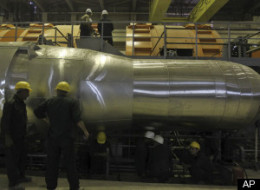Your request is being processed...
Iran Nuclear Reactor Gets First Fuel Injection
ALI AKBAR DAREINI | 10/26/10 03:38 PM | 
What's Your Reaction?
Read More: Iran, Iran First Nuclear Reactor, Iran Nuclear Program, Iran Nuclear Reactor, Islamic Republic Of Iran, Nuclear Energy, Nuclear Reactor, World News
TEHRAN, Iran — Iran began the process of loading 163 fuel rods into the reactor core of its first nuclear power plant on Tuesday, celebrating the achievement as proof that Tehran can outmaneuver international sanctions.The plant, built with Russian help in the southern port city of Bushehr, is not among the aspects of Iran's nuclear program that are of top concern to the international community and is not directly subject to sanctions. It has international approval and is supervised by the U.N.'s nuclear monitoring agency.
Nevertheless, Iran has touted its startup as an act of defiance in the face of the penalties and has held up the plant as evidence that it only has peaceful nuclear intentions. The United States and some of its allies believe Bushehr and Iran's other civil nuclear work is providing cover for a secret weapons program under development.
"The great Iranian nation can manage the sanctions with its resistance, efforts and endeavors and this is its proof," Vice President Ali Akbar Salehi told a news conference broadcast on state TV.
The U.N. Security Council has slapped four rounds of sanctions against Iran over a separate track of its nuclear program – its enrichment of uranium, which can be a gateway to developing atomic weapons.
Iran denies such an intention and says it only seeks to master the technology to produce fuel for a planned network of nuclear power facilities, starting with Bushehr.
On Tuesday, Iran loaded the first three fuel assemblies into the plant's reactor core, beginning a process that will take two months, said Salehi, who is also head of the Atomic Energy Organization of Iran.
The facility is expected to begin supplying electricity to the grid by mid-February.
U.S. Secretary of State Hillary Rodham Clinton made it clear Tuesday that Washington sees a distinction between Bushehr and other nuclear tracks it suspects are meant to give Tehran potential pathways to weapons.
"Iran is entitled to the peaceful use of nuclear power," she said after speaking at a U.N. Security Council meeting to promote women's participation in peacekeeping. "They are not entitled to a nuclear weapons program."
She said she was hopeful that Iran would agree to resume negotiations over the other aspects of its nuclear work.
The European Union has proposed a new round of talks with Iran in Vienna in mid-November with the participation of the United States, Britain, China, France, Russia and Germany. The negotiations foundered a year ago, leading to the fourth round of U.N. sanctions.
The 1,000 megawatt Bushehr plant had been expected to start producing power by November, but a leak in a storage pool delayed the process.
Iranian officials denied the delay had any link to a complex and destructive computer worm, known as Stuxnet, that has swept through industrial sites in Iran and several other countries. The malicious computer code, designed to take control of power plants and other large facilities, infected several personal laptops belonging to employees at Bushehr, though officials said no plant systems were affected.
Iran said it believed the computer worm was part of a Western plot to sabotage its nuclear program. Who created the Stuxnet code and what its precise target is, if any, remains a mystery.
Around the same time, Iran acknowledged that some personnel at its nuclear facilities had been lured by promises of money to pass secrets to the West but insisted increased security had put a stop to the spying.
At Bushehr, soldiers maintain a 24-hour watch on roads leading up to the plant, manning anti-aircraft guns and supported by numerous radar stations.
The Bushehr project was beset by numerous obstacles. It dates backs to 1974, when Iran's U.S.-backed Shah Mohammed Reza Pahlavi contracted with the German company Siemens to build the reactor. The company withdrew from the project after the 1979 Islamic revolution toppled the shah and brought hard-line clerics to power.
In 1992, Iran signed a $1 billion deal with Russia to complete the project and work began in 1995.
Under the contract, Bushehr was originally scheduled to come online in July 1999 but the startup has been delayed repeatedly by construction and supply glitches.
Moscow has cited technical reasons for the delays, but Iranian officials have sporadically criticized Russia, some calling Moscow an "unreliable partner."
The U.S. recently withdrew its long-standing opposition to the plant after Russia satisfied concerns over how it would be fueled and the fate of the spent fuel rods.
Under a deal signed in 2005, Russia will provide nuclear fuel to Iran, then take back the spent fuel, a step meant as a safeguard to ensure it cannot be diverted into a weapons program. Iran has also agreed to allow the U.N.'s nuclear agency to monitor Bushehr and the fuel deliveries.
The United States says the fuel deal with Russia shows Tehran does not need to enrich its own uranium, but Iran maintains it will build other nuclear power plants and has to have its own fuel source.
Iran is already producing its own nuclear fuel – uranium enriched to about 3.5 percent. It also has started a pilot program of enriching uranium to 20 percent, which officials say is needed for a medical research reactor.
Weapons grade material has to be enriched to 90 percent.

